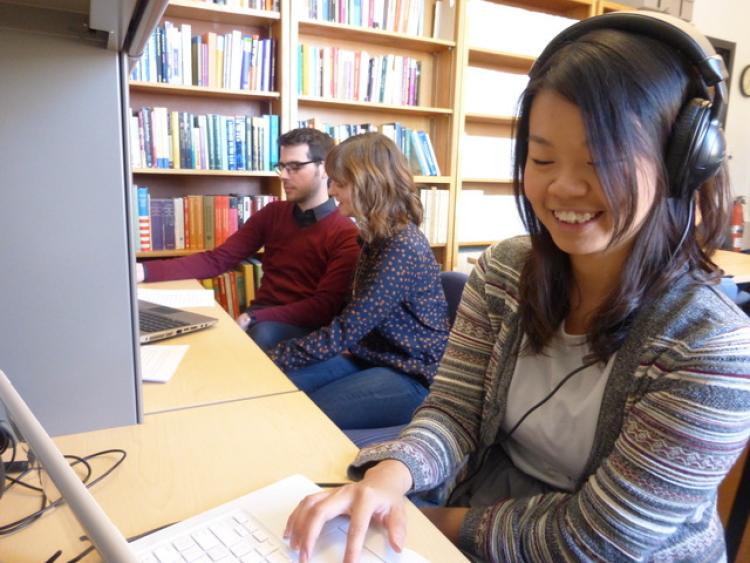Announcing 'Tracks' for the Undergraduate Major in Linguistics

These tracks are: (1) Computational Linguistics, (2) Language and Cognition, (3) Sociocultural, Anthropological, and Interactional Linguistics (SAIL), and (4) Teaching English to Speakers of Other Languages (TESOL).
The four track options are a formalization of the elective credit hour choices that students take alongside the 4 required courses for the Linguistics major. (There is an additional requirement of five credit hours in a language other than English at the 3000 level or above.) Students who complete coursework for one of the tracks will receive an official designation on their transcript.
You can read more about each of the tracks below, with more specific information (including lists of possible elective courses) available by clicking on each one individually. Note also that Course Descriptions for Summer and Fall 2021 courses are available here.
(1) Computational Linguistics Track
More language has been recorded in the last twenty years than in the entirety of human history. Computational linguists use computer science algorithms to automatically process vast amounts of written and spoken communication in moments. This is the mechanism that turns the chaos of billions of individual voices into the symphony that is our civilization. Computational linguistics is an attempt to manufacture the keys to a library containing the sum total of human knowledge and experience. If there are answers to our questions that have already been discovered, we need artificial intelligence to find them.
(2) Language and Cognition Track
The study of linguistic cognition takes you into the heart of the mind. Cognitive linguists examine the language that we use to tell stories, describe feelings and sensory experiences, collaborate with each other and convey our beliefs for clues about the organization of human conceptual systems, our capacity for inference and the remarkably flexible ways in which we understand and communicate our experiences. For example, we can talk about love as a journey, a bond, a container, a force, a vehicle or a patient in need of medical help. These metaphors are not merely rhetorical flourishes--they’re reasoning tools that we use to make abstract concepts like love, life, emotion, ideation, communication, time, causation and purpose concrete. Cognitive linguists study the way meanings change over time, how our visual perception of words and our auditory perception of speech sounds is influenced by expectation and context, how children learn the meanings of words and grammatical patterns as rapidly as they do, how conceptual differences among communities of practice affect judgment and decision making, what happens in the brain as we produce and understand language and how we understand the actions and intentions of others through mental simulation. The study of linguistic cognition combines tools from computer science, cognitive psychology, semantic theory, philosophy of action and neuroscience to connect human reasoning and empathy to the human imagination.
(3) Sociocultural, Anthropological, and Interactional Linguistics (SAIL) Track
Humans use language as part of almost everything we do in social life. Whether we’re chatting with a friend over coffee, participating in a cultural ceremony or performance, seeking help from the doctor, or arguing a case in front of the United Nations, language is there—as an intrinsic part of the human experience. Linguists who work in Sociocultural, Anthropological, and Interactional Linguistics (SAIL) aim to explore the links between language use and social life. How is it that members of communities use language to show who they are to one another, to build alliances and draw boundaries, to take stances and reproduce ideologies? If speakers are ‘getting things done’ through their use of language, linguists with a SAIL emphasis aim to understand what those ‘things’ are, and what role language plays in the process.
(4) Teaching English to Speakers of Other Languages (TESOL) Track
Teaching English as an additional language is an endeavor that comes with great responsibility as well as opportunities for personal growth. In our TESOL courses, we take a critical approach to curriculum design to ensure that instruction builds on learners’ cultural identities, home languages, and previous educational experiences. As reflective practitioners, we grow in our understanding of ourselves and others against the backdrop of various teaching and learning contexts and in light of feedback from a supportive community of practice. Being a TESOL professional is bound to change your life through the people you meet, the places you go, and the person you become as a result of these experiences.
The Department also offers Minors in Linguistics and in Teaching English to Speakers of Other Languages (TESOL).


